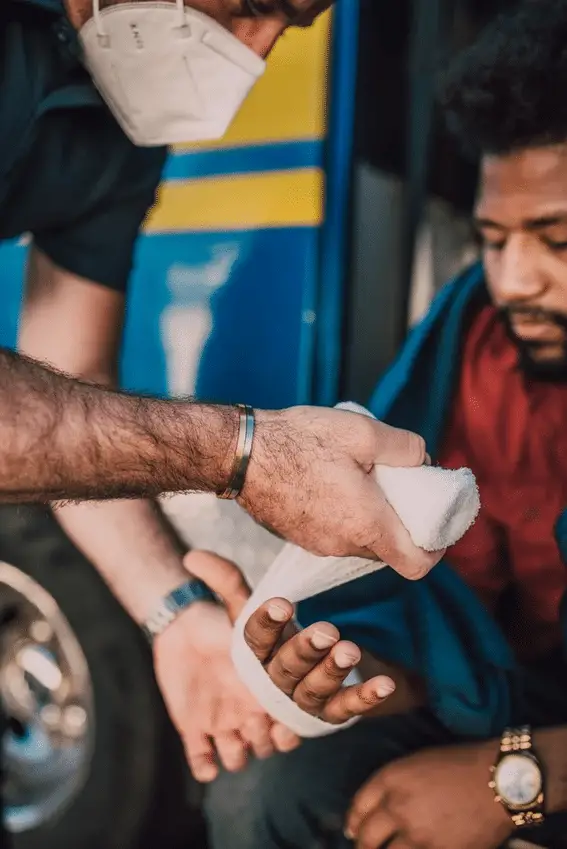There are many factors that should be considered before deciding whether or not you are eligible for compensation. It is highly recommended to seek the advice of a professional who has experience in this field before making any decision.

In order to find out if you may be eligible for compensation after an injury, it is important that you have as much information as possible about your situation and yourself so that it can be compared with the basic requirements for a compensation claim.
1. Contact your doctor
When dealing with personal injury claims, it is vital that you seek medical attention regardless of any internal injuries or pain you might be having. Personal injury lawyers at Hardison and Cochran or any experienced personal injury attorney would advise you to do this. Should any further complications arise, then the best time will be to get yourself checked out by a doctor quickly before anything serious occurs.
If possible, it would also be wise to visit a specialist who will examine your particular type of injury – this includes doctors who work with orthopedic, plastic, neurology, or others. It is also necessary to note that your doctor should be able to provide you with specific information about treatment options and recommended specialists. They may recommend that you seek further medical attention if needed. Otherwise, consider getting a second opinion from another doctor as well – the best course of action would be for you to conduct tests on yourself if you are able to do so safely, using this time to take note of any changes in the status of your injury or condition. However, make sure that these are done at home before visiting your primary care provider again later on.
2. Take notice of whether or not you have medical insurance coverage
Before visiting your doctor, ensure that you have taken note of whether or not you have medical insurance coverage by contacting your insurer or employer. This will be useful information during the consultation with your doctor, so that they are aware of this fact prior to checking on your injury status. If you are uninsured, then there are likely ways to acquire public health care in the United States at little cost to yourself. You should plan ahead by making sure that you are registered with HealthCare.gov, so that you are aware of your options according to the state in which you reside.
There is also information on how your injury can affect your eligibility for compensation available with the SSA website. This site will provide information about whether or not you can receive disability benefit payment if you have suffered an injury due to another party’s negligence.
3. Take notice of whether or not you can return to work safely
It is common knowledge that an injury may affect your ability to be able to work after suffering one; without doing so, you will likely be unable to support yourself and your loved ones. However, certain injuries are more severe than others – it is important that you know your rights before considering any legal action in compensation after an injury case. It would be advisable to take time off from work in order to rest up for a few weeks before starting back at the job again, however. A return-to-work note from your doctor about when they expect you to recover might also help in determining eligibility for compensation after an injury if you are unable to do your normal work tasks. This will be a good time for you to take care of yourself by exercising, getting enough rest, and following doctor’s orders.
However, it is important to note that there are certain cause-and-effect relationships between salary and income, which often change from state to state or even from country to country. In this case, the best thing you can do is get in touch with your employer and inform them about what has occurred in order to see if they might help you out in some way. Your boss might also be able to point out ways in which you may receive compensation after an injury if the accident occurred at work – if so then ensure that their legal department gets involved in addressing your situation.
4. Consult a personal injury lawyer
Whatever the extent of your injury is, your first step should be to consult with a lawyer. The lawyer will help determine if you are eligible for compensation, and they can assist you in deciding what steps to take next. You don’t have to go it alone!
Save any related documents such as medical records and bills. If you get an attorney, they will help you gather any documents that relate to your case. You don’t want to spend time looking through files trying to find them again. Be sure to hold onto them until the attorney advises what should be preserved!
With all the above information, you should have a better idea of whether or not you are eligible for compensation after an injury. If you do feel that you have a strong case, seek out the services of a professional who is experienced in this area before making your decision. Consult with a lawyer to determine if insurance coverage will be available for your injury. If you qualify for compensation, then you can focus on healing and not stressing over finances!
